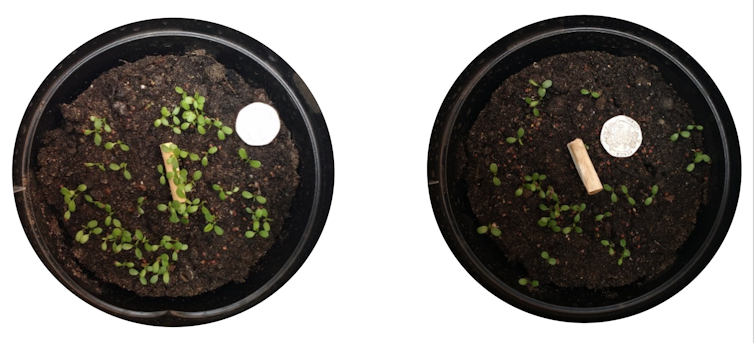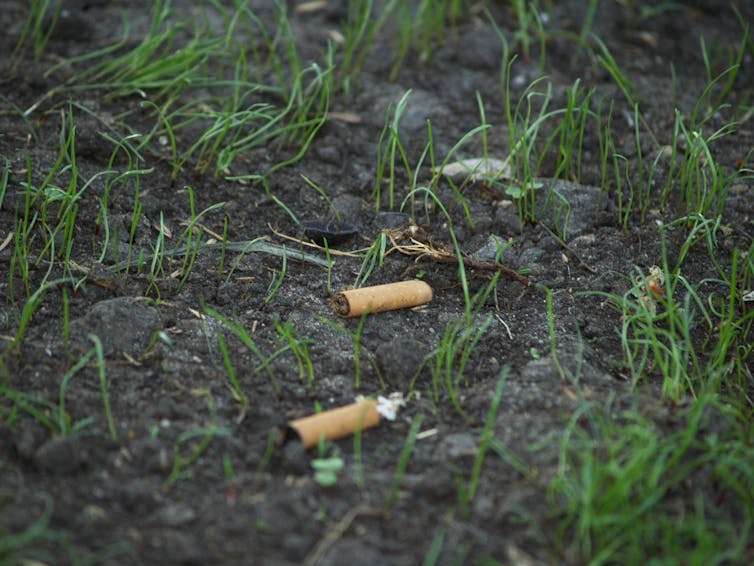Cigarette butts - the forgotten plastic pollution that could be killing our plants
Dannielle Green, Anglia Ruskin University
It’s amazing how quickly people have ditched plastic straws thanks to campaigns to discourage us from using such “pointless plastic”. Yet rarely do we hear about a much more common source of plastic pollution.
Cigarette butts or filters are the most littered item on the planet. An estimated 5.6 trillion cigarettes are smoked each year, out of which two thirds are improperly disposed of. That’s [4.5 trillion butts] each year. Since the 1980s, cigarette butts have accounted for 30% to 40% of all litter found in coastal and urban litter clean-ups.
They are a common eyesore on our streets, our parks, our beaches and in our waterways. Many smokers admit to littering cigarette butts, possibly because they believe them to be benign or biodegradable and somehow do not consider them as litter. But as well as taking much longer to break down than most people think, discarded cigarette butts may significantly damage surrounding plant growth, as our new research suggests.
Cigarette butts are composed of thousands of cellulose acetate fibres and, although biodegradable, take years to disappear from the environment. Cellulose acetate fibres, like other microplastics, are also a common contaminant found throughout the world’s ecosystems, even accumulating at the bottom of the deep sea.
Used filters also contain thousands of chemicals that can kill plants, insects, rodents, fungus and other lifeforms, and some of which are known carcinogens. There are many reports of young children and pet dogs accidentally swallowing cigarette butts, and they’ve even been found in wild animals such as seabirds and turtles. Ingestion can cause vomiting and, in some cases, convulsions. The leachates from cigarette butts can be toxic to aquatic organisms such as bacteria, crustaceans, worms and fish.
Unknown risks
Yet despite the prevalence of cigarette butts as litter in our parks and green spaces, our understanding of their effects on life on land is very limited. There are reports that some birds use them to line their nests. The pesticide nicotine is thought to reduce the number of nest ectoparasites, which is beneficial for the birds’ offspring. But this may also reduce their health in the longer term.
Urban habitats are particularly at risk from this type of litter. In surveys of the three largest parks in Cambridge, my colleagues and I found an average of 2.6 butts per square metre, with a maximum of 126 butts per square metre found near park benches (despite having ashtrays nearby). The burning question for us was, given that cigarette butts are often tossed onto the ground, what effect do they have on the plants in the park?
To answer this question, we conducted an experiment, adding cigarette butts to pots with either grass (perennial ryegrass) or clover (white clover) seeds to see how their development was affected. We tested butts from smoked and unsmoked regular and menthol cigarettes, as well as butt-sized wooden dowels to compare the effect of simply having an inert object on top of the soil.

We found that cigarette butts reduced the germination and shoot length reached by grass and clover by up to 25% and reduced the amount of root biomass of clover by almost 60%.
Although this was the first study showing how smoked and unsmoked cigarette butts may affect plant development, others have found that smoke can cause similar depressive effects on germination and growth. In fact, in the early 1900s, Mabel Elizabeth Dibbel completed a master’s thesis entitled “The effects of cigarette smoke on the seedlings of Vicia sativa”. Dibbel found that blowing puffs of smoke on seedlings retarded their growth and distorted cell structure.
More research needed
Despite scientific awareness of the issue of cigarettes and plants for over 100 years, this remains an under-researched topic. But given the importance of plants as our primary producers of food, not to mention their role in making our environment more pleasant, there is clearly a need to reduce cigarette butt litter.
Some have suggested banning the filters outright, claiming that the health benefits are only minimal and not enough to justify their existence. Perhaps less drastic would be a cigarette butt deposit scheme, in which manufacturers were forced to offer money in exchange for returned butts.
Regardless of the solutions, it is clear that cigarettes’ 39-year reign as the world’s number one litter item needs to come to an end. The first step will be raising awareness that cigarette butts are an environmentally harmful litter item that needs to be properly disposed of.![]()
Dannielle Green, Senior Lecturer in Ecology, Anglia Ruskin University
This article is republished from The Conversation under a Creative Commons license. Read the original article.








